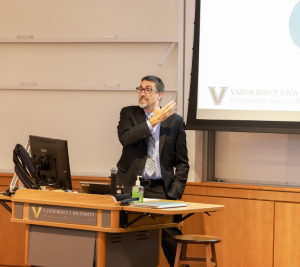By Lacie C. Blankenship
In mid-November, Vanderbilt Business hosted the annual Equity, Diversity, and Inclusion (EDI) Symposium, bringing together students, alumni, faculty, staff, and prospective students for impactful discussions. Professor Tim Vogus, who also serves as the Deputy Director of the Frist Center for Autism and Innovation, led a breakout session where he shared research-based strategies for supporting neurodivergent employees and integrating inclusive practices into the future of work. Below are the key takeaways.

Professor Tim Vogus speaking at the 2024 Vanderbilt Business EDI Symposium
“It is important for people to reframe their thinking with the terminology surrounding neurodiversity,” said Vogus. “Neurocognitive differences are not the same as neurocognitive deficits.”
Defining the Terms
What is neurodiversity?
Neurodiversity or neurodiverse refers to the natural range of variation in neurocognitive functioning and behavioral traits and should be used when referring to groups of people, not individuals.
What is neurodivergent?
The term neurodivergent refers to having a mind that functions in ways that diverge significantly from the societal standards of what is considered typical. Neurodivergence encompasses a range of neurocognitive variations such as autism, ADHD, dyslexia, Tourette’s, and more.
What is neurotypical?
The term neurotypical refers to thinking, processing information, and behaving in ways consistent with social expectations and considered the norm.
The Future of Work & Neurodivergence
 Rethinking Hiring Norms: Eye Contact Isn’t Everything
Rethinking Hiring Norms: Eye Contact Isn’t Everything
Traditional hiring practices often focus on unwritten social expectations, like eye contact and body language, as markers of professionalism; for neurodivergent professionals, these norms do not accurately reflect their abilities or potential. For example, a job candidate on the autism spectrum or with ADHD may struggle with eye contact or staying still and not fidgeting in an interview. Still, those behaviors do not impact their capability to perform tasks effectively or their fit for the job. Neurodivergent job candidates may also experience a high level of anxiety with interviews due to unclear expectations. Employers conducting interviews can reduce these anxieties and facilitate a more accurate appraisal of a candidate’s abilities by simple measures like giving candidates the interview questions in advance and following the script when conducting the interview. Candidates who are given a fair chance to prepare for interviews can better articulate answers in a way that allows their skills and qualifications to be the focus of the conversation.
“Organizations have everything to gain by rethinking hiring norms,” said Vogus. “Interviews don’t need to feel like a pop quiz. By providing candidates with questions in advance and reducing unnecessary social pressures, companies can focus on evaluating the skills that truly matter, rather than irrelevant factors.”
To be Seen is to be Valued at Work
Being seen and heard in the workplace is fundamental to the mutual success of both employees and employers. When employees feel understood and considered, they thrive and can contribute their unique talents and perspectives to the workplace; for neurodivergent professionals, being seen starts with being understood.
“As we continue to look at the future of work, it’s crucial to educate professionals at every level on neurodivergence,” said Vogus. “But for any education and training to be impactful, it needs to be translated into action. That is, revisiting existing processes like hiring, onboarding, and performance management to identify their deficiencies and actively working to make them more neuro-inclusive. That is essential to ensuring that a neurodiverse workforce can thrive.”
Accommodations Drive Success & Sustainable Employment
“Neurodivergent adults are challenged with breaking barriers to enter the workforce, and then they must navigate the often overwhelming task of conforming to neurotypical standards once hired,” said Vogus. “Shapeshifting into a system that wasn’t built for you is not sustainable, no matter how hard you try.”
Job Coaches & Supervisor Relationships
When teams include neurotypical and neurodivergent employees, significant differences in how communication, tasks, and responsibilities are perceived become apparent. These gaps, known as the “double empathy problem,” can hinder performance and contribute to turnover if left unaddressed. To bridge these gaps, it’s crucial to take the time to establish and confirm a shared understanding of expectations, priorities, and personal preferences to foster stronger relationships between neurodivergent employees and their supervisors or peers. Third parties like job coaches can help bridge misunderstandings by providing valuable support to neurodivergent professionals as they navigate workplace dynamics. They can also help neurotypical peers and managers better understand how to create more inclusive conditions that help ensure neurodivergent employees feel understood and empowered to contribute their unique strengths.
Environment is Everything
 The relationship between work environments and productivity is undeniable, even more so for someone with sensory sensitivities. The future of work, especially after the remote and hybrid work movements, has opened doors for professionals to build the work environment that best serves them. However, for in-person workers, and as more organizations mandate return-to-office initiatives, leaders must remember to consider the implications of the environment on productivity and employee gratification. Leaders can help their employees by creating an open dialogue for comments on office configurations, lighting, and sound. For some, noise-canceling headphones may do the trick; for others, swapping a light bulb could be the small modification that makes a big difference.
The relationship between work environments and productivity is undeniable, even more so for someone with sensory sensitivities. The future of work, especially after the remote and hybrid work movements, has opened doors for professionals to build the work environment that best serves them. However, for in-person workers, and as more organizations mandate return-to-office initiatives, leaders must remember to consider the implications of the environment on productivity and employee gratification. Leaders can help their employees by creating an open dialogue for comments on office configurations, lighting, and sound. For some, noise-canceling headphones may do the trick; for others, swapping a light bulb could be the small modification that makes a big difference.
“For example, some neurodivergent people are really sensitive to smells; if they sit near a kitchen in the office, it could be really distracting,” said Vogus. “It’s important for managers to keep this in mind and to be open to helping solve problems.”
Inclusion Makes Innovation
Accommodating the needs of neurodiverse workers shouldn’t require a business case–it’s simply a matter of inclusivity. However, for those needing to justify making a change, it can be noted that organizations with environments where everyone’s voice is respected build stronger, more innovative teams with happier employees, leading to better outcomes. Different ways of thinking bring unique strengths to teams. For example, common strengths associated with autism include concentration, fine detail processing, and memory. Workplaces that embrace neurodiversity often see increased creativity, problem-solving, and innovation. In this way, inclusivity and embracing neurodiversity isn’t just about doing the right thing; it’s also a driver of excellence and strategic advantage for the future of work.
About the Expert: Tim Vogus

Tim Vogus
Tim Vogus, Faculty Director of the Vanderbilt Business Leadership Development Program, Brownlee O. Currey, Jr., Professor of Management, Deputy Director of Frist Center for Autism and Innovation, is nationally recognized for his teaching abilities and research on making healthcare delivery safer and workplaces more inclusive of neurodiversity. Professor Vogus’ research specifies how to create and sustain highly reliable performance by strengthening a safety culture and habituating mindful organizing. He is especially interested in these dynamics in healthcare settings and their effects on care quality. More recently, he has turned his research to creating and sustaining workplace cultures that are more supportive and inclusive of neurodiversity and technologies that can help employers rethink existing practices inimical to neurodiversity (e.g., job interviews, feedback, and performance reviews).
About the Frist Center for Autism and Innovation
The Frist Center for Autism and Innovation at the Vanderbilt University School of Engineering brings together leading engineers, business scholars, academic researchers, and experts in educational and clinical practice, in partnership with self-advocates and other civic stakeholders, to maximize neurodiverse talent within and into the workforce. From a strengths-based understanding of neurodiversity that honors lived experiences, the Center sees opportunities for technological innovation, business models, talent development, future-leader training, and workplace practices.
Vogus noted that the Center has recently been working on an AI-based interviewing system that helps autistic adults overcome some of the barriers to the interview process while also helping employers see real data and real candidates to justify the need to adapt interview processes for mutual success.